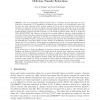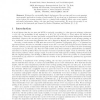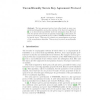64 search results - page 10 / 13 » Secure multi-party quantum computation |
ICQNM
2008
IEEE
14 years 1 months ago
2008
IEEE
Coin flipping is a cryptographic primitive in which two spatially separated players, who in principle do not trust each other, wish to establish a common random bit. If we limit ...
CRYPTO
2010
Springer
13 years 8 months ago
2010
Springer
Due to its universality oblivious transfer (OT) is a primitive of great importance in secure multi-party computation. OT is impossible to implement from scratch in an unconditional...
EUROCRYPT
2011
Springer
12 years 11 months ago
2011
Springer
We define the BQS-UC model, a variant of the UC model, that deals with protocols in the bounded quantum storage model. We present a statistically secure commitment protocol in th...
SOFSEM
2005
Springer
14 years 26 days ago
2005
Springer
Motivated by a potentially flawed deployment of the one time pad in a recent quantum cryptographic application securing a bank transfer [12], we show how to implement a statistica...
IMA
2001
Springer
13 years 11 months ago
2001
Springer
Abstract. The key agreement protocol are either based on some computational infeasability, such as the calculus of the discrete logarithm in [1], or on theoretical impossibility un...



